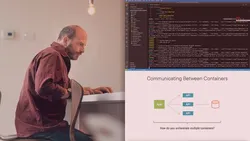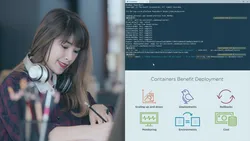
Building and Orchestrating Containers with Docker Compose 
This course provides an introduction to Docker Compose, a tool for building and orchestrating multiple containers. Learn how to increase productivity when creating custom images and managing multiple containers with Docker Compose. ▼
ADVERTISEMENT
Course Feature
![]() Cost:
Cost:
Free Trial
![]() Provider:
Provider:
Pluralsight
![]() Certificate:
Certificate:
Paid Certification
![]() Language:
Language:
English
![]() Start Date:
Start Date:
On-Demand
Course Overview
❗The content presented here is sourced directly from Pluralsight platform. For comprehensive course details, including enrollment information, simply click on the 'Go to class' link on our website.
Updated in [March 06th, 2023]
This course, Building and Orchestrating Containers with Docker Compose, will provide students with the skills and knowledge needed to increase their productivity when building custom images and orchestrating multiple containers. Students will learn the fundamentals of YAML and how it is used by Docker Compose to define services. They will also explore key Docker Compose properties that can be used within services to automate the process of building custom images and running containers. Finally, students will be able to use Docker Compose commands to build custom images, orchestrate running multiple containers, view container logs, and more.
[Applications]
Upon completion of this course, learners will be able to apply their knowledge of Docker Compose to increase their productivity when building custom images and orchestrating multiple containers. Learners will be able to use YAML to define services, use Docker Compose properties to automate the process of building custom images and running containers, and use Docker Compose commands to build custom images, orchestrate running multiple containers, view container logs, and more.
[Career Paths]
1. DevOps Engineer: DevOps Engineers are responsible for the development, deployment, and maintenance of applications and systems. They use Docker Compose to automate the process of building custom images and running containers, as well as to orchestrate multiple containers. As the demand for DevOps Engineers continues to grow, the need for professionals with expertise in Docker Compose will also increase.
2. Cloud Engineer: Cloud Engineers use Docker Compose to build custom images and orchestrate multiple containers used by their applications. They also use Docker Compose to automate the process of deploying applications to the cloud. As cloud computing continues to grow in popularity, the need for Cloud Engineers with expertise in Docker Compose will also increase.
3. Software Developer: Software Developers use Docker Compose to build custom images and orchestrate multiple containers used by their applications. They also use Docker Compose to automate the process of deploying applications to the cloud. As software development continues to evolve, the need for Software Developers with expertise in Docker Compose will also increase.
4. System Administrator: System Administrators use Docker Compose to build custom images and orchestrate multiple containers used by their applications. They also use Docker Compose to automate the process of deploying applications to the cloud. As the demand for System Administrators continues to grow, the need for professionals with expertise in Docker Compose will also increase.
[Education Paths]
Recommended Degree Paths:
1. Bachelor of Science in Computer Science: This degree path provides students with a comprehensive understanding of computer science fundamentals, including programming, software engineering, and data structures. Students will also learn about the latest technologies and trends in the field, such as cloud computing, artificial intelligence, and machine learning.
2. Master of Science in Software Engineering: This degree path focuses on the design, development, and maintenance of software systems. Students will learn about software engineering principles, software development methodologies, and software testing techniques. They will also gain experience in developing software applications for various platforms.
3. Master of Science in Cloud Computing: This degree path focuses on the design, implementation, and management of cloud-based systems. Students will learn about cloud computing architectures, cloud security, and cloud-based services. They will also gain experience in developing cloud-based applications and services.
4. Master of Science in Artificial Intelligence: This degree path focuses on the development of intelligent systems and applications. Students will learn about artificial intelligence algorithms, machine learning techniques, and natural language processing. They will also gain experience in developing intelligent applications and services.
Course Provider

Provider Pluralsight's Stats at AZClass
Pluralsight ranked 16th on the Best Medium Workplaces List.
Pluralsight ranked 20th on the Forbes Cloud 100 list of the top 100 private cloud companies in the world.
Pluralsight Ranked on the Best Workplaces for Women List for the second consecutive year.
AZ Class hope that this free trial Pluralsight course can help your Docker skills no matter in career or in further education. Even if you are only slightly interested, you can take Building and Orchestrating Containers with Docker Compose course with confidence!
Discussion and Reviews
0.0 (Based on 0 reviews)
Explore Similar Online Courses

Learn Javascript and Jquery Online with this tutorial

The Places of Teaching Artistry

Python for Informatics: Exploring Information

Social Network Analysis

Introduction to Systematic Review and Meta-Analysis

The Analytics Edge

DCO042 - Python For Informatics

Causal Diagrams: Draw Your Assumptions Before Your Conclusions

Whole genome sequencing of bacterial genomes - tools and applications

Managing Docker on Linux Servers

Fundamentals of Docker and Kubernetes for NET Developers

WSL 2 Docker Kali Linux and Windows Terminal - get started
 Related Categories
Related Categories
Quiz
 Submitted Sucessfully
Submitted Sucessfully
1. What is Docker Compose?
2. What is YAML used for in Docker Compose?
3. What is one of the commands used in Docker Compose?


Start your review of Building and Orchestrating Containers with Docker Compose